The practice and study of medicine in Persia has a long and prolific history. The Iranian academic centers like Gundeshapur University were a breeding ground for the union among great scientists from different civilizations. These centers successfully followed their predecessors’ theories and greatly extended their scientific research through history. Persians were the first establishers of modern hospital system.
Safavid lacquer work illustrating a physician taking the pulse of a patient. From a 17th-century copy of Avicenna's Canon of Medicine. Wellcome Library, London.
A 500-year-old Latin translation of the Canon of Medicine by Avicenna
Ibn Sina, commonly known in the West as Avicenna, was a preeminent philosopher and physician of the Muslim world, flourishing during the Islamic Golden Age, serving in the courts of various Iranian rulers. He is often described as the father of early modern medicine. His philosophy was of the Muslim Peripatetic school derived from Aristotelianism.
Portrait of Avicenna on an Iranian postage stamp
Coin of Majd al-Dawla (r. 997–1029), the amir (ruler) of the Buyid branch of Ray
Coin of Ala al-Dawla Muhammad (r. 1008–1041), the Kakuyid ruler of Isfahan
The Mausoleum of Avicenna, Hamadan, Iran






